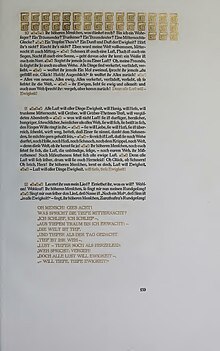Zarathustra's roundelay


Zarathustra's
The poem first appears in Thus Spoke Zarathustra's chapter "The Second Dance-Song", then reappears in a later chapter, "The Drunken Song".[3]
German original
O Mensch! Gib acht!
Was spricht die tiefe Mitternacht?
»Ich schlief, ich schlief—,
Aus tiefem Traum bin ich erwacht:—
Die Welt ist tief,
Und tiefer als der Tag gedacht.
Tief ist ihr Weh—,
Lust—tiefer noch als Herzeleid:
Weh spricht: Vergeh!
Doch alle Lust will Ewigkeit—,
—will tiefe, tiefe Ewigkeit!«
Selected English translations
O man! Lose not sight!
What saith the deep midnight?
"I lay in sleep, in sleep;
From deep dream I come to light.
The world is deep,
And deeper than ever day thought it might.
Deep is its woe—
And deeper still than woe—delight.
Saith woe: 'Pass, go!
Eternity's sought by all delight—,
Eternity deep—by all delight!'"
O man! Take heed!
What saith deep midnight's voice indeed?
"I slept my sleep—
"From deepest dream I've woke and plead:—
"The world is deep,
"And deeper than the day could read.
"Deep is its woe—
"Joy—deeper still than grief can be:
"Woe saith: Hence! Go!
"But joys all want eternity—
"Want deep profound eternity!"
Textual characteristics
This section is empty. You can help by adding to it. (January 2023) |
Interpretation
This section is empty. You can help by adding to it. (December 2022) |
See also
References
- ISBN 978-0-203-09270-5.
- ISBN 979-10-365-2455-4, retrieved 2023-01-21
- ^ JSTOR 854955.
- ^ Nietzsche, Friedrich Wilhelm (1899). Thus spake Zarathustra: a book for all and none. The Works of Friedrich Nietzsche. Vol. II. London: T. Fisher Unwin. pp. 339–40, 483.
- ^ Nietzsche, Friedrich, "Part Three", Thus Spake Zarathustra, retrieved 2022-12-24
Further reading
- Hollinrake, Roger (1982). "6. Zarathustra's Roundelay". Nietzsche, Wagner and the Philosophy of Pessimism. Routledge. ISBN 978-0-203-09270-5.
- ISBN 979-10-365-2455-4, retrieved 2023-01-21
